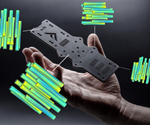Henkel partnering in SYMPA research project for 3D-printed composites in automotive
Goals include new materials, printing and post-processing technologies for durable fiber reinforcement using stereolithography (SLA) and digital light processing (DLP).
Henkel (Düsseldorf, Germany) is partnering in a research and development project called SYMPA, that is sponsored by the German Federal Ministry of Education and Research (BMBF; Bonn) and the Federal Ministry Republic of Austria Transport, Innovation and Technology (BMVIT; Vienna). The German and Austrian project consortium aims to develop new materials, printing methodologies and post-processing technologies for durable Stereolithography (SLA) products using Digital Light Processing (DLP) with a focus on automotive applications. SYMPA started at the end of 2018 and involves five partners bringing different expertise along the entire value chain of the SLA technology.
The project partners believe that the SLA technology has a huge potential to enable the production of customized parts and products specifically designed for customer needs, especially in automotive. Thus, SYMPA aims to overcome some of the weaknesses of current SLA materials, such as low mechanical properties, low durability and low UV stability. The innovation objectives include the development of a new photosensitive polymer with increased long-term thermal and mechanical properties, the fiber reinforcement of the polymer and surface modification technologies to further enhance the environmental resistance of products. All developed technologies will be demonstrated based on real automotive parts, considering the requirements on industrial production processes.
SYMPA is coordinated by the Institute of Aircraft Design (IFB) of the University of Stuttgart, and its partners include:
- Henkel AG & Co. KGaA, has developed high-performance photopolymers with improved mechanical and thermal durability for the SLA technology;
- The Institute of Aircraft Design (IFB; Stuttgart, Germany) brings its background in lightweight construction and composite applications, including fiber-reinforced SLA materials for strongly increased mechanical properties and fatigue limit;
- Rapid Shape GmbH (Heimsheim, Germany) offers high-speed open 3D printing systems that can be adopted with different process extensions to meet various material or customer requirements and environmental conditions;
- Joanneum Research and INOCON Technologie GmbH specializes in development and application of plasma technology for coating and activation, such as deposition, post-processing and surface modification for better mechanical and environmental resistance, controlled wettability and electric conductivity of polymers; and
- cirp GmbH (Heimsheim, Germany) is an experienced 3D-printing service provider that enables technology demonstrations on real automotive structures and improved design processes of SLA components.
SYMPA has been set up for three years until end of 2021 resulting in an SLA toolbox as preliminary stage for tailored 3D printing solutions in the automotive industry.
For more details on SLA and DLP processing to produce fiber-reinforced composites, see the CW blog: “Magnetic 3D printing the next generation of tailored composites.”
Related Content
-
Recycling end-of-life composite parts: New methods, markets
From infrastructure solutions to consumer products, Polish recycler Anmet and Netherlands-based researchers are developing new methods for repurposing wind turbine blades and other composite parts.
-
Plant tour: Middle River Aerostructure Systems, Baltimore, Md., U.S.
The historic Martin Aircraft factory is advancing digitized automation for more sustainable production of composite aerostructures.
-
Natural fiber composites: Growing to fit sustainability needs
Led by global and industry-wide sustainability goals, commercial interest in flax and hemp fiber-reinforced composites grows into higher-performance, higher-volume applications.












